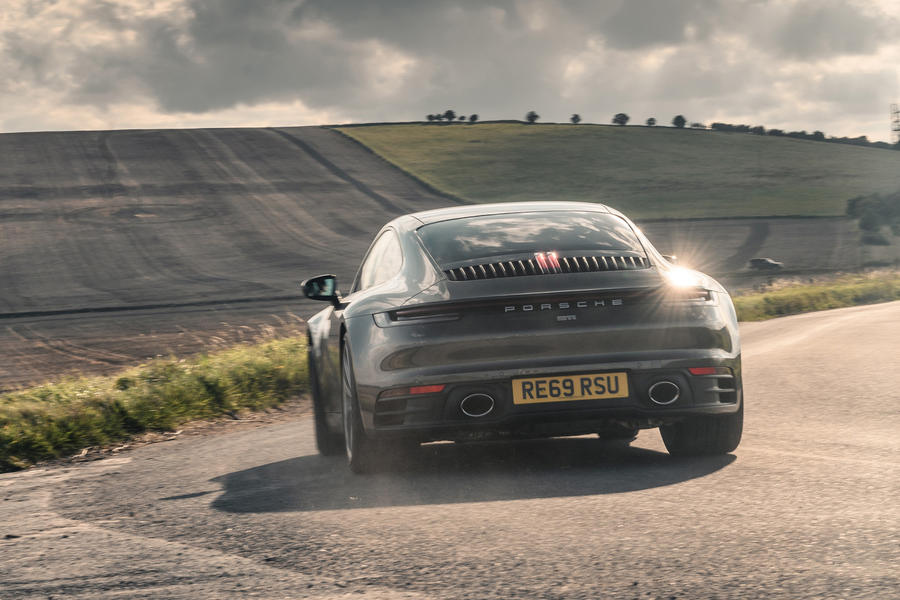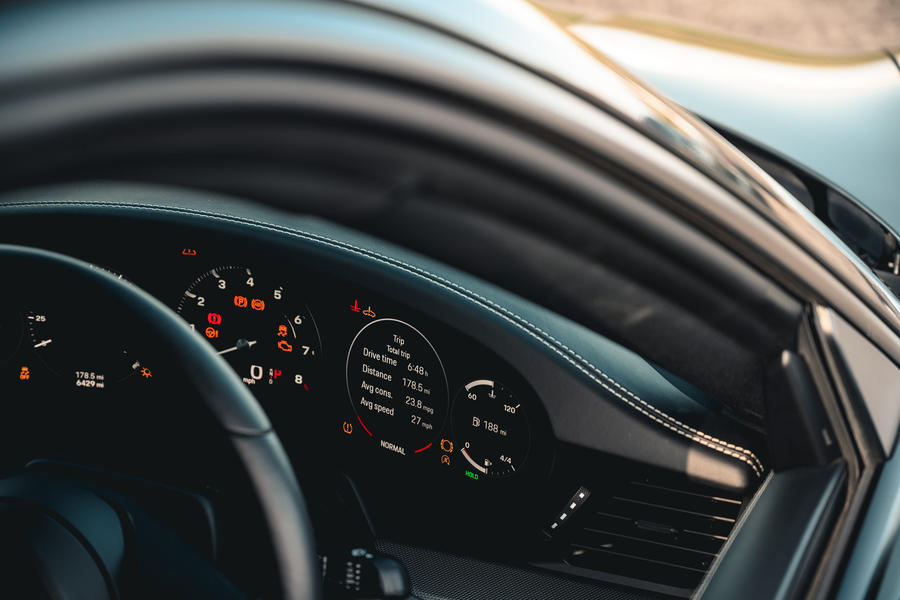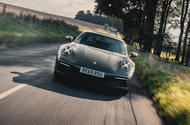Our base 911 is shorn of frills but isn’t short on appeal. It’s time to have some fun
Why we’re running it: Because this is the world’s most famous sports car in its purest form. How much 911 do you really need?
Month 1 – Specs

Life with a Porsche 911: Month 1
Welcoming the 911 to the fleet – 21 October 2020
Home working meant it had been six months since I’d met up with Autocar’s picture editor, Ben Summerell-Youde, and even more time had passed since seeing snapper Olgun Kordal, photographers being strangers to the office at the best of times.
On our reacquaintance one sunny early autumn day in a rural Oxfordshire car park, the small talk lasted about eight seconds before we all started poring over the Porsche 911 I’d arrived in. Cue nerd alert.
Olgun pointed out that the engine cover at the rear has nine vent slats on each side and then an ‘11’ motif in the middle for the central vertical brake light, thus spelling 911. I admired the 3D Porsche badging at the rear, loving its integration below the horizontal light bar. Ben was cooing over the surfaces, noting how the increase in size of the car actually allowed for not only better proportions but also better looks.
This went on for quite a few minutes before we decided we should actually go and take some photos of the car. As I pulled away, I smiled: the pre-photoshoot car park meet is ordinarily something Autocar does hundreds of times a year, but I can’t recall one with so much time spent examining a car’s details, nor one when we knew about so many of those details in advance.
But that’s the 911 for you. They’re special cars; familiar, but in a good way. Not everyone will love them, but everyone (well, nearly everyone) respects them and has their own story to tell. Many enthusiasts know a lot about them and shudder at any suggestion that all 911s are, and always have been, the same. The variants seemingly grow with each generation, but pretty much all arrive with a pretty clear purpose.
What we have here is the new 992 generation. It’s not totally box-fresh any more, having been first launched last year. (And since then, incidentally, Ben, Olgun and I have all spent plenty of time around them, which only goes to show what a special moment any time with a 911 is, however ‘familiar’ it might be.) This particular version, on our fleet for just a few short but special weeks, is the one from which all future versions of the 992 will be derived: the standard Carrera.

Our classy-looking Aventurine Green 911 has been on Porsche’s press fleet for almost a year. In that time, it has racked up more than 6000 miles and been driven by many other motoring titles – and ourselves, for a brief first drive late last year. Steve Cropley actually drove this car to my house halfway through his test, and the 20 miles or so I managed in the pouring rain confirmed enough about its breadth of qualities while also whetting the appetite for more.
The story here, then, comes in the form of three questions. What does a 911 feel like after a year of hard use? Well, I can answer that after the 300 miles I’ve done so far: as good as it felt back in December when I first drove it. Second, we know how usable 911s are, but how does usability extend to even the most mundane of drives, week after week? And third, just how much 911 do you need? That last question is particularly pertinent given the spec of our car. The Carrera is, of course, rear-wheel drive and has the lowest power output of any 911. Yet 380bhp from its twin-turbo 3.0-litre flat six instead of the 444bhp of the Carrera S a step up the food chain sounds plenty enough to me. We shall see.
This car has relatively few options. I know, £8098 worth of extras on top of an £82,793 car sounds like a lot, but it still costs less to buy than an optionless Carrera S. Remove the £1145 S alloys and the £1599 14-way adjustable electric sports seats and you’ve arguably got all the 911 you really need. That’s not a definitive conclusion, though, in case anyone at Porsche thinks we’re done with the car already…
Given we’re not commuting to the office for now, I’m doing far fewer miles, so each journey has a different kind of purpose. I’m also running a Honda E, a short-range electric city car that is proving to be ideal for the 80% of journeys that really are just down the road. As such, the 911 spent 48 hours on my drive before I drove it in anger for the first time.
That drive was wonderfully humdrum – a five-mile trip to a neighbouring town on a Saturday morning – but it was a delight. From behind the wheel, the 911 feels nowhere near as wide as it looks. It manages bumps with far greater compliance than its big wheels and sports car silhouette would have you believe. And, road noise aside, it’s quiet and comfortable enough for general pottering around.

Put your foot down and this 911 feels the right kind of fast: definitely more sports car than supercar, progressive in its power delivery and never threatening to overwhelm either its driver or the road. It flatters and lets you have fun, which is a word I think we’ll be coming back to over these next few weeks.
Second Opinion
This car confirms a lesson I learned 30 years ago: that while owners commonly add many thousands in options to their base 911, if they restrained themselves they’d still have a great car. The only thing a 911 needs is LED headlights, ideally the matrix type. Otherwise, a 911 Carrera is terrific out of the box, as this car proves.
Steve Cropley
Porsche 911 Carrera specification
Specs: Price New £82,793 Price as tested £90,891 Options Sports exhaust £1844, 14-way electric memory sports seats £1599, 20/21in Carrera S wheels £1145, Aventurine Green metallic paint £876, Dynamic LED headlights £699, Park Assist with rear camera £464, Black/Island Green two-tone leather interior £422, privacy glass £387, auto-dimming mirrors £387, Porsche crest-embossed headrests £161, Porsche crest wheel centres £114
Test Data: Engine Flat 6, 2981cc, twin turbo petrol Power 380bhp at 6500rpm Torque 332lb ft at 1950 to 5000rpm Kerb weight 1595kg Top speed 180mph 0-62mph 4.2sec Fuel economy 28.5mpg CO2 206g/km Faults None Expenses None

Source: Autocar
